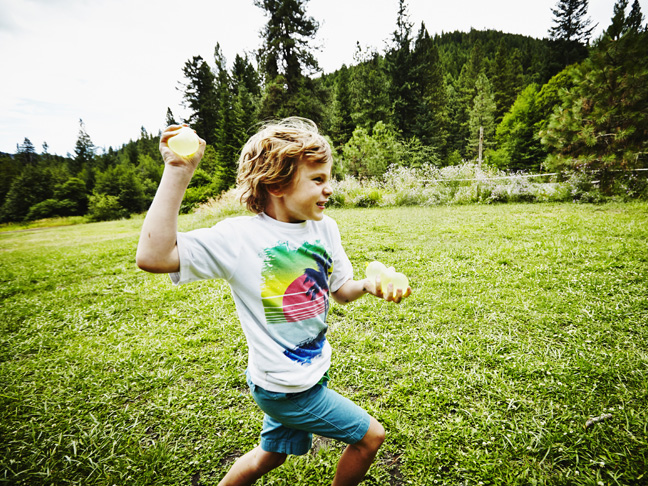Yesterday was the quintessential lazy day of summer around here. It sprinkled in the morning, so the kids were lost in play, drawing, and books for the most of the morning. When the sun finally emerged we made our way outside to play home run derby. The heat and humidity were overwhelming by late afternoon and the kids started to feel tired and cranky. So I hooked up the sprinkler. Their moods shifted in an instant.
Squeals of delight echoed through the air as they ran back and forth. They played baseball in their bathing suits and later hooked the spray nozzle to the hose to water every flower, tree, and weed in the yard. They were happy, silly, and full of life. Free play in the great outdoors will do that to you.
It’s amazing what kids can do with nothing but some greenery and their imaginations. My kids have a secret clubhouse in one corner of the yard, and a fairy village tucked beside the shed. They teach nature school all over the yard. They don’t need props, fancy toys, or organized playgroups. They simply need time and nature.
Sounds simple enough, and yet it isn’t always that simple. Life gets busy for young families. Organized sports, camps, enrichment activities, and scheduled play dates all eat away at time that could be spent in nature. I’m an under-scheduler by nature, but, even so, I’ve had to learn to slow down and let nature in. Nature might surround us, but we don’t always stop to appreciate it. That’s a shame, really, because time spent in green spaces boasts many benefits for kids.
In fact, a recent study found that kids with more exposure to greenery, particularly on the path to school (if walking there) and during the day while in school, showed better attention spans and superior working memory skills. This is the latest in a growing body of research demonstrating the cognitive, emotional, and physical benefits of time spent in nature.
Check out these reasons to skip the structured activities this summer and send your kids outside to play, instead:
1. Their coordination gets a boost. Kids who get out and play in the natural world show better gross motor skills, such as increased balance and agility. With the natural world as their playground, kids learn to take healthy risks and figure out how to use their muscles to reach their goals. Tree climbing and balancing on logs that might tip require different skills than climbing a ladder on a play structure, for instance. Kids are more physically active when they have regular access to outdoor play. This helps curb the risk of childhood obesity.
2. They feel less stressed. Interacting with nature is calming. Whether kids spend time nurturing plants in a garden or watching a colony of ants busy at work, connecting with nature provides an opportunity to slow down and regulate emotions. Taking a walk in a green space can help kids practice deep breathing and calming their senses. Guided imagery scripts often tap into nature for good reason. Connecting with the sounds of birds chirping, waterfalls (or waves), or even leaves rustling in the wind helps us disconnect from stress while reconnecting with the peaceful sounds that surround us (but are often clouded by the business of life).
3. Their problem-solving skills become sharper. There’s a lot to be said for the endless toys available to kids today, but one downside is that problem solving is made easier by high tech solutions. When kids connect with nature, they work on problem solving skills without the help of fancy toys and gadgets. To build a secret clubhouse outside, for instance, kids might figure out a way to use sticks and vines to create a door or ceiling. They might consider how to create a path without harming the flowers and trees. When we remove the toys and allow children to tap into their own resources, they learn to work together and solve problems.
4. There’s an improvement in academic performance. When kids engage with nature on their own terms, they feed their natural curiosity. Time spent outside might spark an interest in animals, flowers, or environmental science (to name a few). It’s no big secret that kids love to make their own discoveries, and spending time outdoors is akin to an endless personal classroom. Instead of Googling answers to questions that might arise during outdoor play, get to your local library and borrow some books on the subject.
Give your child the gift of nature as much as possible this summer. While structured activities certainly help kids thrive at times, unstructured time in nature helps kids thrive across multiple domains.
Photo: Getty








